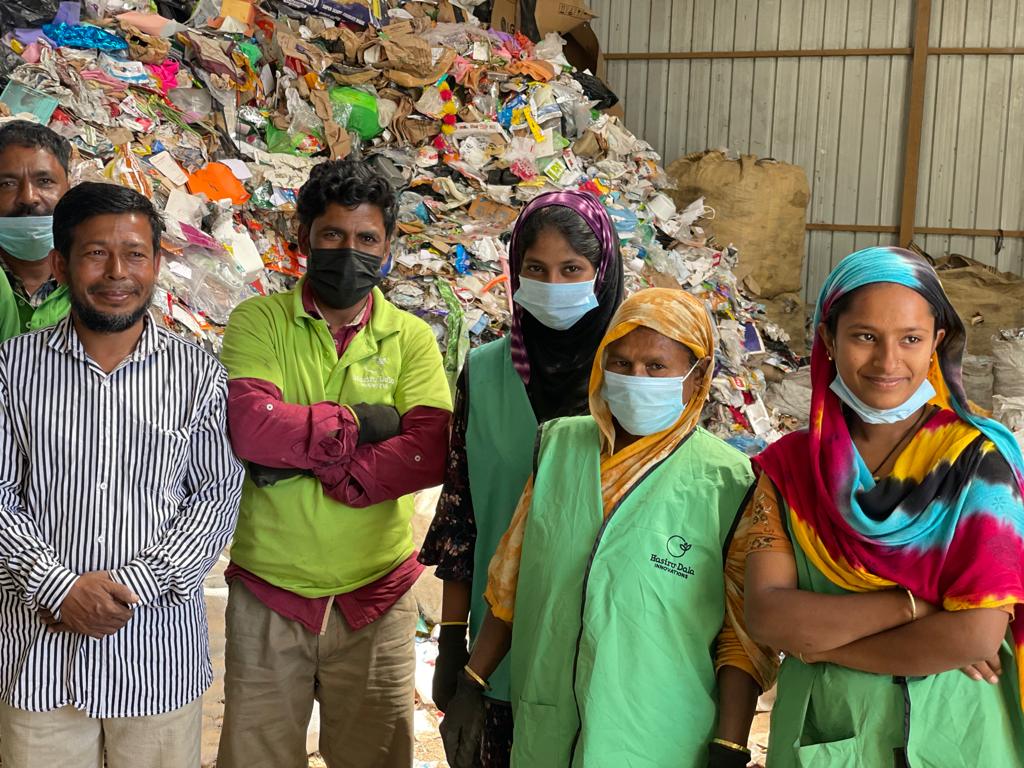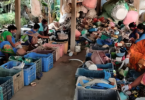H &M is giving circular buttons a whole new meaning.
Waste pickers in India sell plastic waste recovered from the streets of Bengaluru to Hasiru Dala Innovations, (HDI) a social enterprise. HDI supplies button manufacturers with the fair trade guaranteed plastic waste; the manufacturers then turn it into buttons with 40% recycled plastic that the H&M Group’s apparel makers buy and attach to clothing sold worldwide.
Over 150 million of the round fasteners have already been sewn onto clothing sold by H&M. The circular buttons are traceable down to the source of the waste along with names of the workers, their salaries and working conditions at HDI’s aggregation center.
It is just one example of how HDI is working with large companies to both further social inclusion and enable the circular economy.
“The E and S in ESG [Environmental, Social and Governance] need to be intertwined,” says Shekar Prabhakar, HDI’s co-founder and CEO. “A lot of companies are looking at recycled plastic in products. The E is easily addressable but rather than solving only for the environment why not work for a just transition?”
It is called Inclusive Circularity.“There is an opportunity now to include people who otherwise could be dis-intermediated while transitioning to a circular economy and we are demonstrating that it can be done,” he says.
Championing Waste Pickers
In India alone, 62 million tons of waste is generated annually and only 15% of the waste is processed and treated, according to the H &M Foundation. The invisible force behind recycling is the estimated 1.5 to 4 million informal waste pickers who make their living by collecting, cleaning, sorting, and segregating this waste.
Hasiru Dala (HD) was launched as a not-for-profit organization in 2013 to achieve social justice for waste pickers, the most marginalized amongst the urban poor in India. For starters it pioneered these workers getting occupational ID cards from the government. “For many this is document zero,” says Prabhakar. “They don’t even have birth certificates and can’t open bank accounts.” HD helps them gain access to social security schemes, healthcare and housing, provides them with skills training and helps their children enroll and stay in school.
An opportunity to help the waste pickers earn more reliable incomes presented itself in 2015 when the city of Bangaluru announced that bulk generators of waste – apartment complexes or any entity that generates 100 kilos of waste per day – would have to separate and process their own garbage, opening the door for private providers. HD decided to step in, using waste pickers as its entrepreneurs and workers.
The waste workers collect segregated waste (dry, wet and sanitary) and transport it to designated processing units. The collected dry or recyclable waste is sorted into various categories such as plastic, paper, metal etc. and send it to recycling units. They convert wet or organic waste to compressed bio-gas which replaces liquefied petroleum gas and organic compost for agriculture as well as urban gardens and parks. They send the sanitary waste for safe and scientific incineration or landfilling.
HD started its business with three apartment complexes as customers. At the end of the first year that number had mushroomed to 40. “We realized this was a real, scalable business and that not-for-profit was probably not the right model,” says Prabhakar. “We needed operational and business rigor to scale it and attract investment capital,” he said, HDI became a separate private limited company with a mission to develop and execute innovative circular economy business models that integrate and transform waste pickers to green professionals and entrepreneurs. In addition to raising equity capital, it recently raised a term loan of $187,500 from Yunus Social Business, an organization co-founded by Nobel Peace Laureate Prof. Muhammad Yunus. and Saskia Brysten which invests in social businesses in developing countries with affordable financing and growth support.
HDI soon branched out into other areas of waste management services: helping event hosts on how to reduce and manage their waste and aggregating plastic waste with the goal of ensuring better prices for waste pickers and scrap dealers.
“Once we got all of this into place, we started to look at how do we get brands to pay for the social impact we are creating,” says Prabhakar.
To that end HDI launched a Fair Trade Plastics Recycling initiative (HDI is fair trade guaranteed by the World Fair Trade Organization) in association with the global personal care brand The Body Shop and Plastics for Change, a Canadian company. The economics of that partnership did not work out, but HDI learned from it, says Prabhakar.
“We ensure that the scrap dealers and other micro waste entrepreneurs get a fair price and that all transactions are done by bank – no cash – so they can establish a credit history for themselves and be included in the financial system,” he says.
A Partnership With A Purpose
HDI then became a supplier of low-density polyethylene (LDPE) plastic waste to a joint venture between Yunis Social Business and Cofresco, a German family-owned company that is part of the Melitta Group which has pledged to become fully circular by 2025. Their Bangaluru-based joint venture, called Vishuddh Recycle, is a social business that sources recyclable plastic materials from collection partners.
“The original plan was that they would engage directly with waste pickers but people like [Prabhakar] are already doing this so it made sense for them to buy from HDI,” says Brysten, co-founder and CEO of Yunus Social Business.
Cofresco recycles the plastic waste into pellets which are in turn used in Melitta’s production of Swirl and Handy Bag brand trash bags. The proportion of recycled resources in the trash bags has been increased to 70% and Cofresco vows that number will increase to 100% in the coming years.
Getting there required overcoming numerous challenges. It was Cofresco’s first business activity in India. “We had to familiarize ourselves with the system there and the requirements,” CEO Oliver Strelecki stated in a written response to questions from The Innovator. “In addition, the recycling business is new to us. Here, too, we had to familiarize ourselves. And last, but not least, the Corona pandemic has given us some additional challenges and greatly disrupted the course of the project. “
The joint venture has been running successfully since last year. It has not only helped Cofresco to achieve its own goals it is helping the company contribute to the U.N.’s Sustainable Development Goals by improving the working and living conditions of waste collectors and creating new jobs with good social standards at its recycling plant; helping to create a circular economy for plastics, thereby lessening the pollution of land and water; and partnering with organizations focused on social goals such as HDI, he says.
“We not only regard partnerships as an opportunity to achieve a greater impact, but also to achieve sustainable innovations through the interaction of different perspectives and expertise,” Strelecki says.“ This is why we would definitely encourage other companies to forge partnerships and joint ventures.”
From Bin Liners To Buttons
Building on its success with Cofresco, early last year HDI contracted with H&M to supply it with recycled plastic for use in buttons.
“We are very happy that we have been able to onboard Hasiru Dala Innovations as the supplier of PET plastic waste to be used in our buttons in India,” H&M stated in a written response to questions from The Innovator. “It’s a supplier that ticks all the boxes for us. The impact of Hasiru Dala Innovations on our total emissions is small, and it doesn’t change our whole supply chain impact per se. It rather shows the importance of addressing social sustainability alongside environmental sustainability.”
H&M says it is currently looking into expanding the scheme to other markets, and H&M Group is investigating how to expand it to other brands in the family.
HDI “is a partner that we hope can serve as inspiration for the industry,” says H&M. “We encourage others to follows suit and look into purchasing these buttons too. Image the impact if this was scaled globally.”
HDI is not stopping with bin liners and buttons. It says it expects to soon announce that a major FMCG global brand will make the shampoo bottles it sells in India with up to 40% PET plastic recycled from waste collected by its supply chain of waste pickers and micro waste entrepreneurs.
Creating New Markets
Corporates can learn from social enterprises like HDI about new business models that provide value from waste while also enabling social inclusion, says Yunis Social Business CEO Bruysten.
While PET plastics and electronic waste is now being recycled almost everything else is still being incinerated. “There is a great opportunity for brands to truly move the needle on plastic pollution if they would start looking at eliminating lower value wrappers from their packaging by either designing out the waste or, if they can’t, to start using recycled low value plastic and create a market for it,” says Bruysten. “If brands are willing to pay the price for recycling low value plastic and start using that in their packaging, they will create a market for waste workers to pick it up, sort it, aggregate it and recycle it,” leading to less litter and an even better standard of living for those that collect it, she says.
The Multiple Ways Corporates Can Embrace Social Business
Waste management is not the only way corporates can engage with social business, says Bruysten.
Another example of social procurement is Swedish home furnishings giant IKEA’s work with Indian crafts company Rangsutra . The collaboration with Rangsutra has created livelihoods for 1100 people and has resulted in several IKEA collections and global products. The artisans are mostly female, and the majority are also shareholders in the company, which has a mission to empower women in the rural areas, most whom have never had a job outside of the home before.
Corporates can also directly invest in social businesses in their industry. For instance Danone, a French multinational food products company created the Danone Communities Fund, which invests in social businesses in its sector and incubates innovation pilots.
Corporates can also create business units with a social focus. For example Axa, the French multinational insurance company, has developed Axa Emerging Customers insurance products for people in emerging markets who could not typically afford insurance. Axa has reached over 11 millions people with these services.
“These are three examples of concrete ways that corporates can get involved in social business,” says Bruysten. ” If you are interested get in touch with us.“
This article is content that would normally only be available to subscribers. Sign up for a four-week free trial to see what you have been missing.
To access more of The Innovator’s Profits With A Purpose articles click here.







